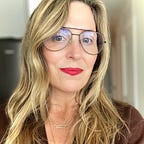Adoption, Abuse, Acceptance: Finally Saying What I Find So Difficult To Speak.
Coming to terms with life at mid-passage.
CW: sexual and physical abuse
Sometimes I wonder what it would’ve been like, the other life, the first life, the kept life; the life where she named me Caroline instead of Baby Girl. Would she have told my father? Would she have found him — sweating in the strong sun, knee deep in rich West African mud building homes (not fighting war) — and said to him in her sweet Southern drawl, “This is your daughter.” Would she have unwrapped the soft bundle in her arms and shown him my blue eyes, sparkling just like his? Would he have taken me in his arms and said, “You are wanted”?
In that life, she smells like crisp sweet honey and velvet gardenia, and he is damp musk, the scent of work and clay, and together they smell like home; a two-story brick facade center hall colonial down a long gravel drive lined with weeping willows. In the backyard, she lays a white cotton blanket on the deep green grass and sips sweet tea while I coo and roll and rock my tiny body back and forth as I begin the journey to upright.
In that life, I am not an object of curiosity and wonder (When did they tell you? Do you want to find your real parents? Who do you look like?) or cuttlefish — changing…
